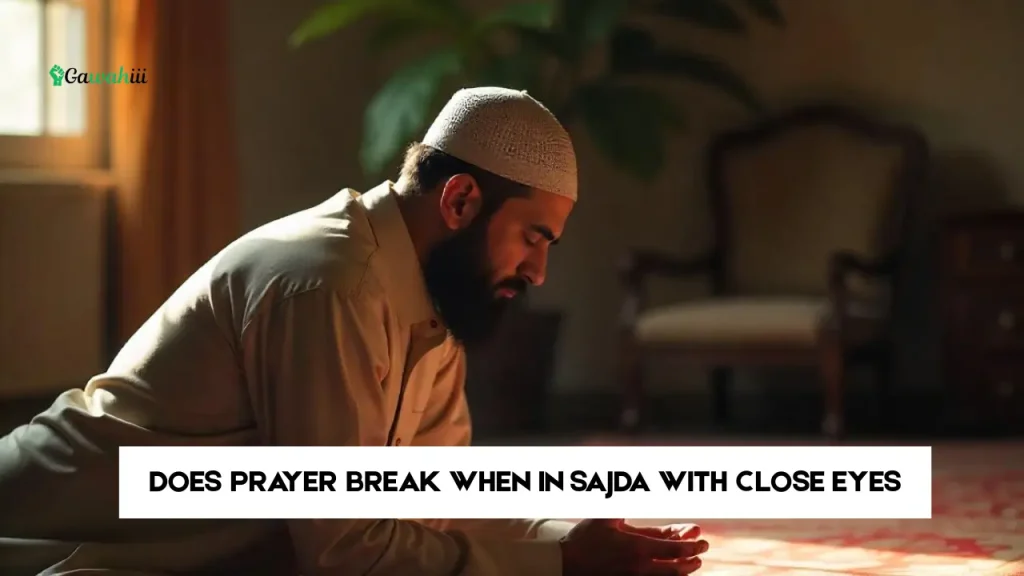Introduction
The fifth pillar of the daily life of a Muslim is prayer (Salah). All actions, words, and motives during prayer are to emulate that the individual is very close to Allah. To ensure that they are performing their Salah in a way that is approved by God, many believers are therefore keen enough to ensure that the sanctity of their Salah is not compromised. The most common one that arises is, does prayer break when in sajda with the eyes near? This issue is an indication of the interest among Muslims to perfect their worship and make it conform to the Islamic teachings.
This subject is going to be covered thoroughly in this article and will be presented as an intercourse between academic opinions, sources, and common sense. This post will answer the question of whether or not it is prohibited to close your eyes when you are making prostration (sajda), together with other rulings and etiquette that deal with that matter.
So, let us take a look at the commentaries of Islamic scholars, frequently asked questions, pieces of advice, and conclusions by the Quran, Sunnah, and consensus (Ijma’) of the scholars.
Insights into the Ruling of Keeping the Eye Closed during Salah
The issue of whether to keep the eyes open during Salah is debatable, particularly when falling into Sajda (prostration). Others fear that this will nullify their prayer or even diminish its reward.
Key Points:
- The overall rule in Islamic law must be that all the acts of prayer must conform to the Sunnah without a valid reason.
- Most scholars believe that the closing of the eyes nullifies prayer.
- Looking at girls is discouraged (makruh) unless it is to increase concentration or eliminate distraction.
Summary:
- Even closing of eyes is permissible whenever it results in augmentation of khushu (devotion), particularly in Sajda.
- However, shutting the eyes regularly when there is no necessity may be contrary to the prophetic way (Sunnah).
What Goes On In Sajda, Position, Purpose, and Presence
The position of Sajda (prostration) is a very strong one in Salah; it means that a Muslim is submitting fully to Allah.
Sajda as Discussed in Detail:
- There have to be faces, palms, knees, and toes on the ground.
- This posture is that which depicts humility and proximity to Allah.
- It is the time that a believer is nearest to his/her Lord.
The relation to eye closure:
- Researchers concur that Sajda must be performed in a very concentrated form.
- This may be an alternative to cover up distractions during Sajda by closing the eyes.
- Conclusion: It is not a sin, and it is not cancelled; in the event that closing your eyes makes you feel you are more in Sajda and can concentrate, then it is helpful.
Khushu (Concentration) in Prayer
Prayer aims to attain khushu’, a concentrated and distraction-free, humble and attentive state of mind.
Boosting Khushu’:
- Distractions through the eyes can also break concentration, particularly in a messy environment.
- The act of closing the eyes would be helpful, where the touching of khushu’ is promoted.
- Some scholars, such as Imam Al-Ghazali, tolerated eye closing provided that it is a step towards mindfulness.
Summary:
- The Islamic jurists are more focused on the inner attention rather than paying a lot of attention to a strict formality, as long as all the pillars of the prayer are met.
- A periodical closing of the eyes to preserve khushu is upheld.
Academic Positions: Hanafi, Maliki, Shafi’i, Hanbali Positions
Hanafi:
- Dislikes (makruh) closing the eyes except for concentration.
Maliki:
- Tends in general to find it unwanted.
Shafi’i:
- Just like Hanafi, it is okay as long as it is done in order to stay focused.
Hanbali:
- It allowed closing the eyes provided that it does not lead to distraction.
- Conclusion: The agreement on permissibility exists when it is used in the interest of better prayer.
Exercise of the Eye in Salah: Common Misconceptions
It is a common belief amongst people that taking the eyes shut in prayer is a bid’ah (innovation) or sin. Let’s clarify:
Myth and Reality:
- Myth: Closing your eyes breaks prayer.
- Reality: It does not disqualify prayer.
- Myth: Non-Sunnis are the only people doing it.
- Fact: Even scholars in every school spoke about its permissibility.
There is a problem:
- Closing the eyes is a habit in the absence of a legitimate reason.
- Thinking that it is a requirement in Islam without any backup.
Scientific and Psychological Point of View
Contemporary psychology asserts this view by holding that mental distractions decrease concentration. Islamic prayer can thus result in having wandering thoughts.
Psychological Benefits:
- The shutting of the eyes minimizes the intake of sensations.
- Creates spiritual consciousness and alertness.
Scientific Findings:
It is proven that people can find concentration more readily when their eyes are closed in meditative or prayer-like modes.
In Practice:
When you are praying somewhere noisy or distracting, then closing your eyes when pronouncing the verse therein, Sajda may also help you regain your focus.
Cases When it is Appropriate to Close Eyes
In those cases where the mind is on the line, Islam permits one to be accommodating.
When It Is Time to Close Your Eyes:
- In a packed mosque with much traffic.
- Under the conditions of visual distraction, such as blinking lights, children’s games, etc.
- The feeling that one is overwhelmed or having difficulties in concentration.
- Note: Never intend (niyyah) to receive some comfort or to laze in such a case, but to increase your prayer.
Finding the Middle Ground: Form and Emphasis on the Same Page
Islam is a moderate faith. Any form of extreme outer rituals that have no heart or a total lack of form that is full of feelings is not acceptable.
The problem is how to balance things:
- Follow Sunnah as much as possible by keeping your eyes open.
- Cover them when distractions are necessary, such as during Sajda or Tashahhud.
- Do not do it as a daily habit for no reason.
- Prophetic Balance: Muhammad, the messenger of God (ﷺ), kept the beauty of the outer form of worship (prayer) and the inner calm.
Sajda Tips to Improve Your Performance
- These tips will help you to have a better Sajda, whether you have closed your eyes or not:
- Consider the meaning of the Sajda, and you will find it means that on which you can impose no conditions whatsoever.
- It is also good to have a short pause before and after Sajda to internalize presence.
Recite Dua in Sajda very slowly and attentively.
- Take a clean and quiet environment so that you do not have any excess visual distractions.
- BONUS TIP: Repetition of extra duas in Sajda during voluntary prayers (nafl) to become closer.
Case Studies—The Real-Life Situations and Winning Expert Judgment.
Case 1:
A prayer in a hostel is done by a student who is surrounded by a hustling crowd. He covers his eye in Sajda so as not to be distracted. Ruling: Good prayer: it is permissible to close eyes.
Case 2:
The woman prays every day in her silent room and always keeps her eyes shut since this is more spiritual. Conclusions: It is sound, but doing it without having to is frowned upon.
Scenario Ruling
- A distraction that makes the eyes close. It is permissible, not sinful.
- Eye closing without a cause, okay, but not encouraged.
- Thinking that it is needed False assumption
- Illness leads to the closing of the eyes. Allowed
FAQs
Will closing your eyes during Sajda break your prayers?
No. It is acceptable and does not nullify prayer, particularly when it aids concentration.
Is it Sunnah to keep eyes open during Salah?
The Sunnah indeed is to keep eyes open with a center of Sujood. They can be closed when necessary, however.
Is it Makruh to close eyes in every prayer?
Yes, when such is done repeatedly on an invalid excuse. It can look in the form of extraneous elements of prayer.
4. Are you able to close your eyes during the whole Salah?
It’s not recommended unless necessary. It should always aim at khushu’ (concentration) and not comfort.
Does the Hadith prohibit closing of the eyes?
There are no pure Hadiths that prohibit it. The view that it is Makruh is one of scholarly inference and not a first-hand Hadith.
Conclusion
When you close your eyes during Sajda, you do not break your prayer. Although the acceptable primary custom is to keep the eyes open in a position of prostration and look at where to prostrate, the Islamic faith can be flexible at times when it increases connection with God and prevents distraction.
Salah is about the outermost and the inner faith. Closing your eyes can move you closer to Allah, more so in Sajda; then, by all means, it is not a sin but a good thing to do. Simply do not make it a strict habit without a reason.
Learn more, remain alert when praying, and concentrate on perfecting sincerity (ikhlas) and presence (khushu’) of each step and each moment.
- Also read this:
- part







